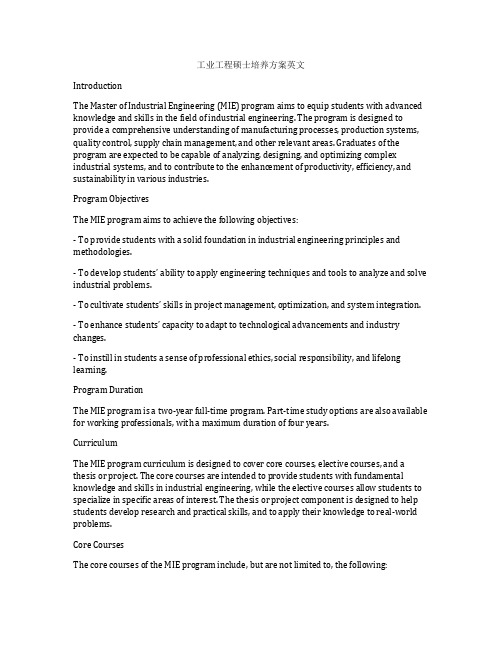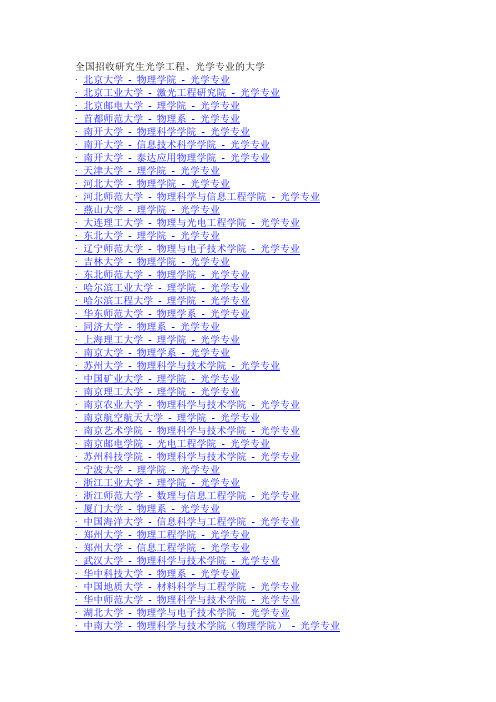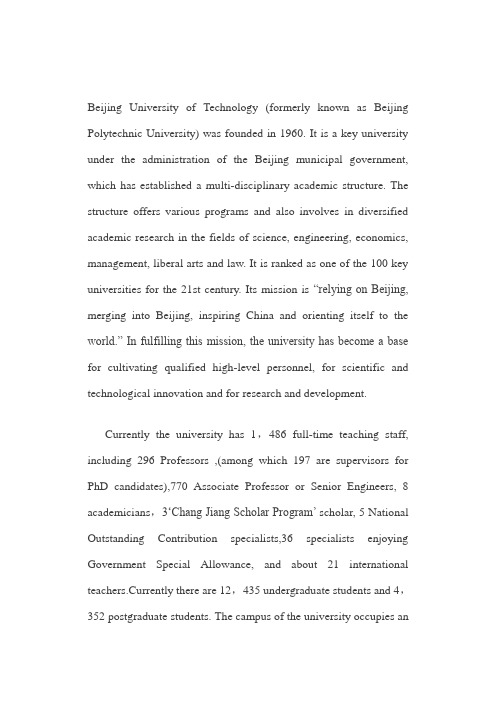北京工业大学光学工程培养方案(英文版)
应用物理学(光学工程) 专业人才培养方案

应用物理学(光学工程)专业人才培养方案专业代码:070202学科门类:工学一、培养目标本专业培养具有正确的世界观、人生观和价值观,良好的思想道德修养和心理素质,具备扎实的物理学基本理论、基本方法、基本技能和应用技术基础,适应社会发展需要,能在物理学、光学工程及相关的科学技术领域从事科学研究、技术开发、产品设计、管理与市场营销等工作的高素质应用型高级技术人才。
二、培养规格与要求(一)培养规格本专业学生主要学习应用物理学(光学工程)的基本理论与技术,具有良好的数学基础和实验技能, 受到应用研究、技术开发以及工程技术的初步训练 , 具有良好的科学素养,适应高新技术发展的需要,具有较强的知识更新能力和较广泛的科学适应能力。
(二)素质要求毕业生应获得以下几方面的知识和能力:1. 掌握数学、计算机等方面的基本原理、基本知识,具有较好的人文艺术、社会科学、管理科学、外语基础和语言文字表达能力;2. 掌握扎实的物理学基础理论、广泛的应用物理知识、基本实验方法和技能,具备运用光学工程方向的知识和技能进行应用研究、技术开发的能力和一定的计算机应用能力;3. 了解相近专业以及应用领域的一般原理和知识,具有终身学习意识、创新意识和较强的自学能力;4. 了解应用物理(光学工程)的理论前沿、应用前景和最新发展动态以及相关高新技术产业的发展状况;5. 掌握文献检索、资料查询及运用现代信息技术获取相关信息的基本方法,具有一定的科学研究能力和较强的实际工作能力。
三、主干学科和主要课程(一)主干学科物理学、光学(二)主要课程应用光学、物理光学、模拟电子技术、数字电子技术、电动力学、量子力学、激光原理四、学制标准学制:四年最长修业年限:八年五、授予学位工学学士六、教育教学活动时间安排四年制本科教育教学活动时间安排表七、课程结构及学时、学分分配注:括号内为可选课程考试门数(四)各学期周学时统计注:括号内为可选课程周学时八、课程设置及学时分配表通识通修平台课程注:*学时不计入总学时九、有关说明(1)考核类型c为考查,s为考试;(2)文化素质讲座(含师范专业的教师教育讲座)每学期举行,要求每生至少选听15次;(3)每生至少参加社团1个;(4)基础必读书由各学院制订书目并在第六学期组织考核;(5)第二学期到第六学期举办课外科技活动竞赛,每生至少参加一次。
光学工程一级学科(0803)硕士学位研究生培养方案

(适用专业:080300光学工程)
一、学科专业培养目标
应掌握光学和光学工程坚实的专业理论基础及较广泛的相关学科专业知识。在具体从事的研究领域中初步具有独立进行理论和实验研究的能力和从事技术开发的能力。有严谨求实的科学作风。熟练掌握一门外国语。硕士学位获得者能从事本专业或相近专业的科研、教学、工程技术和管理工作。
二、研究方向
1、现代光学技术及工程应用
2、光信息传输与处理
3、光电测控技术及仪器
4、光电子技术及应用
三、课程设置
序号 课程类型 课程编号 课程名称 学时 学分 开课学期 备注 授课/实验 1 公共学位课 S1199001 自然辩证法 54 2 1 2 公共学位课 S1199003 科学社会主义理论与实践 36 1 2 3 公共学位课 S1199004 第一外国语(英、日、俄) 128 3 1、2 4 公共学位课 S1199006 专业外语(英、日、俄) 32 1 2 5 公共学位课 S1199012 数理方程 48 2 1 6 公共学位课 S1199009 矩阵论 48 2 1 7 公共学位课 S1199013 小波分析 48 2 1 8 学科学位课 S1202001 现代光学基础 32 2 1 9 学科学位课 S1202002 仪器光学 32 2 1 10 学科学位课 S1202003 近代光学测试技术 32 2 1 11 选修课 S2302001 半导体激光器原理 32 2 2 12 选修课 S2302002 半导体材料生长 32 2 2 13 选修课 S2302003 半导体材料测试技术 32 2 2 14 选修课 S2302004 半导体器件物理 32 2 2 15 选修课 S2302005 导波光学 32 2 2 16 选修课 S2302006 光电子学与器件 32 2 2 17 选修课 S2302007 高级光学设计 32 2 2 18 选修课 S2302008 光学仪器总体设计 32 2 2 19 选修课 S2302009 理论物理初步 32 2 2 20 选修课 S2302010 动态光学 32 2 2 21 选修课 S2302011 数字图像处理 32 2 2 22 选修课 S2302012 现代光电测试技术 32 2 2 23 选修课 S2302013 CCD应用技术 32 2 2 24 选修课 S2302014 激光通信技术 32 2 2 25 选修课 S2302015 光电仪器设计理论 32 2 2 26 选修课 S2302016 现代光学加工技术 32 2 2 27 选修课 S2302017 光学系统自动设计 32 2 2 28 选修课 S2302018 TPS及应用 32 2 2 29 选修课 S2302019 遥感技术 32 2 2 30 选修课 S2302020 光学信息处理 32 2 2 31 选修课 S2302021 现代传感技术 32 2 2 32 选修课 S2302022 机器视觉 32 2 2 33 选修课 S2302023 全息干涉计量 32 2 2 34 选修课 S2302024 光学传递函数及应用 32 2 2 35 选修课 S2302025 化合物半导体材料与器件 32 2 2 36 选修课 S2302026 半导体光电子器件 32 2 2 37 选修课 S2302027 半导体光电子学 32 2 2 38 选修课 S2302028 材料表面检测技术 32 2 2 39 选修课 S2302029 半导体激光工艺学 32 2 2 40 选修课 S2302030 半导体激光器在军事上的应用讲座 32 2 2 41 选修课 S2302031 OPTI 502.Optical Design and Instrumentation I 32 2 2 42 选修课 S2302032 OPTI 505R. Diffraction and Interferometry 32 2 2 43 选修课 S2302033 OPTI 508. Probability and Statistics in Optics 32 2 2 44 选修课 S2302034 OPTI 509. Optical Design and Instrumentation II 32 2 2 45 选修课 S2302035 OPTI 511R. Optical Physics & Lasers 32 2 2 46 选修课 S2302036 OPTI 512R. Linear Systems, Fourier Transforms 32 2 2 47 选修课 S2302037 OPTI 513R. Optical Testing 32 2 2 48 选修课 S2302038 OPTI 530. Optical Communication Systems 32 2 2 49 选修课 S2302039 OPTI 576. Thin Film Optics 32 2 2 50 选修课 S2302040 OPTI 604. Mathematical Methods for Optics 32 2 2 51 选修课 S2302041 OPTI 515 Photonic Devices and Systems 32 2 2 52 必修环节 S3102001 科研训练 1 53 必修环节 S3102002 学术活动与报告(5次) 1
工业工程硕士培养方案英文

工业工程硕士培养方案英文IntroductionThe Master of Industrial Engineering (MIE) program aims to equip students with advanced knowledge and skills in the field of industrial engineering. The program is designed to provide a comprehensive understanding of manufacturing processes, production systems, quality control, supply chain management, and other relevant areas. Graduates of the program are expected to be capable of analyzing, designing, and optimizing complex industrial systems, and to contribute to the enhancement of productivity, efficiency, and sustainability in various industries.Program ObjectivesThe MIE program aims to achieve the following objectives:- To provide students with a solid foundation in industrial engineering principles and methodologies.- To develop students’ ability to apply engineering techniques and tools to analyze and solve industrial problems.- To cultivate students’ skills in project management, optimization, and system integration. - To enhance students’ capacity to adapt to technological advancements and industry changes.- To instill in students a sense of professional ethics, social responsibility, and lifelong learning.Program DurationThe MIE program is a two-year full-time program. Part-time study options are also available for working professionals, with a maximum duration of four years.CurriculumThe MIE program curriculum is designed to cover core courses, elective courses, and a thesis or project. The core courses are intended to provide students with fundamental knowledge and skills in industrial engineering, while the elective courses allow students to specialize in specific areas of interest. The thesis or project component is designed to help students develop research and practical skills, and to apply their knowledge to real-world problems.Core CoursesThe core courses of the MIE program include, but are not limited to, the following:- Industrial Engineering Fundamentals- Production Systems Analysis- Quality Engineering- Lean Manufacturing- Supply Chain Management- Operations Research- Project Management- Industrial Automation- Human Factors in Engineering- Engineering Economics- Industrial Safety and Ergonomics- Sustainable ManufacturingElective CoursesStudents are required to take a certain number of elective courses to fulfill the program requirements. The elective courses cover a wide range of topics, including:- Advanced Topics in Industrial Engineering- Advanced Manufacturing Technologies- Advanced Quality Control- Advanced Supply Chain Management- Decision Support Systems- Simulation and Modeling- Data Analytics for Industrial Engineering- Logistics and Distribution Management- Six Sigma and Continuous Improvement- Product Design and Development- Industrial RoboticsThesis or ProjectStudents are required to complete a thesis or a project as part of the program requirements. The thesis option is suitable for students who are interested in conducting in-depth research in a specific area of industrial engineering, while the project option is more practice-oriented and is ideal for students who want to address industry-related challenges. Both options are designed to help students demonstrate their ability to apply industrial engineering principles and methodologies to solve real-world problems.InternshipThe MIE program may offer internship opportunities for students to gain practical experience in industrial settings. The internship is optional but highly encouraged, as it provides students with valuable exposure to industry practices and a chance to apply their knowledge and skills in a professional environment.Admission RequirementsApplicants to the MIE program are required to have a bachelor’s degree in engineering or a related field from an accredited institution. A minimum GPA may be required, along with other specific admission criteria. Relevant work experience and professional certifications may also be considered in the admission process.Career OpportunitiesGraduates of the MIE program are well-prepared for a wide range of career opportunities in various industries, including but not limited to manufacturing, logistics, healthcare, consultancy, and technology. Possible job titles for MIE graduates include industrial engineer, production manager, quality assurance specialist, supply chain analyst, operations research analyst, project engineer, and more. Additionally, graduates may pursue further education or research in the field of industrial engineering.ConclusionThe Master of Industrial Engineering program offers a comprehensive and rigorous education in the field of industrial engineering. With a focus on both theoretical knowledge and practical skills, the program aims to produce competent and innovative professionals who can contribute to the advancement of industrial processes and systems. Graduates of the program are expected to be well-equipped to tackle complex industrial challenges and to make significant contributions to the efficiency, productivity, and sustainability of industries worldwide.。
全国招收研究生光学工程、光学专业的大学

全国招收研究生光学工程、光学专业的大学·北京大学- 物理学院- 光学专业·北京工业大学- 激光工程研究院- 光学专业·北京邮电大学- 理学院- 光学专业·首都师范大学- 物理系- 光学专业·南开大学- 物理科学学院- 光学专业·南开大学- 信息技术科学学院- 光学专业·南开大学- 泰达应用物理学院- 光学专业·天津大学- 理学院- 光学专业·河北大学- 物理学院- 光学专业·河北师范大学- 物理科学与信息工程学院- 光学专业·燕山大学- 理学院- 光学专业·大连理工大学- 物理与光电工程学院- 光学专业·东北大学- 理学院- 光学专业·辽宁师范大学- 物理与电子技术学院- 光学专业·吉林大学- 物理学院- 光学专业·东北师范大学- 物理学院- 光学专业·哈尔滨工业大学- 理学院- 光学专业·哈尔滨工程大学- 理学院- 光学专业·华东师范大学- 物理学系- 光学专业·同济大学- 物理系- 光学专业·上海理工大学- 理学院- 光学专业·南京大学- 物理学系- 光学专业·苏州大学- 物理科学与技术学院- 光学专业·中国矿业大学- 理学院- 光学专业·南京理工大学- 理学院- 光学专业·南京农业大学- 物理科学与技术学院- 光学专业·南京航空航天大学- 理学院- 光学专业·南京艺术学院- 物理科学与技术学院- 光学专业·南京邮电学院- 光电工程学院- 光学专业·苏州科技学院- 物理科学与技术学院- 光学专业·宁波大学- 理学院- 光学专业·浙江工业大学- 理学院- 光学专业·浙江师范大学- 数理与信息工程学院- 光学专业·厦门大学- 物理系- 光学专业·中国海洋大学- 信息科学与工程学院- 光学专业·郑州大学- 物理工程学院- 光学专业·郑州大学- 信息工程学院- 光学专业·武汉大学- 物理科学与技术学院- 光学专业·华中科技大学- 物理系- 光学专业·中国地质大学- 材料科学与工程学院- 光学专业·华中师范大学- 物理科学与技术学院- 光学专业·湖北大学- 物理学与电子技术学院- 光学专业·中南大学- 物理科学与技术学院(物理学院)- 光学专业·湖南师范大学- 物理与信息科学学院- 光学专业·中山大学- 物理科学与工程技术学院- 光学专业·暨南大学- 理工学院- 光学专业·华南师范大学- 物理学- 光学专业·深圳大学- 电子科学与技术学院- 光学专业·广西大学- 物理科学与工程技术学院- 光学专业·四川大学- 物理科学与技术学院- 光学专业·四川大学- 电子信息学院- 光学专业·四川大学- 原子与分子物理研究所- 光学专业·电子科技大学- 光电信息学院- 光学专业·四川师范大学- 电子工程学院- 光学专业·重庆大学- 数理学院- 光学专业·西南大学- 物理科学与技术学院、电子信息工程学院- 光学专业·西北大学- 物理所、物理系、光子所- 光学专业·西安交通大学- 理学院- 光学专业·西北工业大学- 理学院- 光学专业·西安电子科技大学- 理学院- 光学专业·西安工业大学- 西安工业大学- 光学专业·西安建筑科技大学- 理学院- 光学专业·西安理工大学- 理学院- 光学专业·陕西师范大学- 物理学与信息技术学院- 光学专业·兰州大学- 物理科学与技术学院- 光学专业·北京师范大学- 物理系- 光学专业·北京师范大学- 核科学与技术学院- 光学专业·北京师范大学- 天文系- 光学专业·复旦大学- 物理学系- 光学专业·复旦大学- 信息科学与工程学院- 光学专业·复旦大学- 先进材料与技术研究院- 光学专业·徐州师范大学- 物理系- 光学专业·哈尔滨师范大学- 理化学院- 光学专业·西北师范大学- 物理与电子工程学院- 光学专业·华南理工大学- 物理科学与技术学院- 光学专业·福建师范大学- 物理与光电信息科技学院- 光学专业·福州大学- 物理与信息工程学院- 光学专业·华侨大学- 信息科学与工程学院- 光学专业·山东大学- 物理与微电子学院- 光学专业·济南大学- 理学院- 光学专业·山东师范大学- 物理与电子科学学院- 光学专业·聊城大学- 物理科学与信息工程学院- 光学专业·安徽师范大学- 物理与电子信息学院- 光学专业·安徽大学- 物理与材料科学学院- 光学专业·中国科学院- 等离子体物理研究所- 光学专业·中国科学院- 武汉物理与数学研究所- 光学专业·中国科学院- 合肥物质科学研究院- 光学专业·河南大学- 物理与电子学院- 光学专业·南昌大学- 理学院- 光学专业·中国地质大学(北京)- 数学与物理学院- 光学专业·中国地质大学(北京)- 材料科学与工程学院- 光学专业·贵州大学- 理学院- 光学专业·昆明理工大学- 理学院- 光学专业·西南师范大学- 物理学院、电子与信息工程学院- 光学专业·山西师范大学- 物理与信息工程学院- 光学专业·长江大学- 长江大学专业列表- 光学专业·河南师范大学- 物理与信息工程学院- 光学专业·山西大学- 物理电子工程学院- 光学专业·内蒙古师范大学- 物理与电子信息学院- 光学专业·延边大学- 理学院- 光学专业·黑龙江大学- 物理科学技术学院- 光学专业·长春理工大学- 理学院- 光学专业·烟台大学- 光电信息科学技术学院- 光学专业·中国矿业大学- 理学院- 光学专业·中国矿业大学(北京)- 理学院- 光学专业·喀什师范学院- 专业列表- 光学专业·伊利师范学院- 专业列表- 光学专业·天津理工大学- 理学院- 光学专业·光学精密机械研究所- 专业列表- 光学专业·赣南师范学院- 专业列表- 光学专业·华东理工大学- 理学院- 光学专业。
光学工程硕士培养方案

光学工程硕士培养方案光学工程是一门融合光学、电子学、计算机科学等多学科知识的交叉学科,培养具备光学原理和工程应用能力的专业人才。
光学工程在现代科技领域发展迅猛,对各个行业的发展起到关键作用。
一、专业课程学习1.光学原理:学习光的传播、干涉、衍射、散射、吸收和非线性光学等基础原理,了解光的基本性质和现象。
2.光学设计与仿真:学习光学元器件的设计原理和仿真方法,熟悉常见的光学设计软件和光学系统的优化方法。
3.激光技术:学习激光的基本原理和应用,包括激光器的设计、激光系统的构建和激光在医疗、通信、制造等领域的应用。
4.光电子学:学习光电传感器、光电探测器、光电器件等基础知识,了解光电子学在通信、图像传感、测量等领域的应用。
5.光学信息处理:学习数字图像处理、光学图像识别、光学信息存储等内容,培养从光学信息中提取有用信息的能力。
除了以上基础课程,还包括选修课程,供学生根据个人兴趣和发展方向自由选择。
选修课程内容包括:光纤通信、光学薄膜技术、光学仪器设计等。
二、科研实践光学工程硕士培养方案注重培养学生科研实践能力,通过科研项目的参与,学生将深入了解光学前沿技术和研究方向,培养科学研究的方法和思维。
在导师指导下,学生将进行科研项目的立项、实验设备的操作和数据的处理分析,最终完成一篇科学论文的撰写和发表。
三、实验室培训光学工程硕士培养方案将实验室培训作为重要组成部分,学生将参与各类实验室的实验操作和项目开展,熟悉光学仪器的使用和维护,掌握实验方法和技能。
实验室培训包括光学通信实验、激光器操作实验、光学薄膜技术实验等。
四、专业实践光学工程硕士培养方案强调专业实践能力的培养,将实践环节融入课程学习和科研实践中。
学生将有机会参与实际光学工程项目的设计与实施,锻炼实际问题解决的能力。
通过与企业合作、参与行业实践等形式,学生将了解光学工程的应用领域和行业发展趋势。
综上所述,光学工程硕士培养方案通过专业课程学习、科研实践、实验室培训和专业实践等环节,全面培养学生光学原理和工程应用能力,使其成为具备科学研究和工程实践能力的专业人才,能够在光学工程领域从事科研、设计和应用工作。
北京工业大学英语简介

Beijing University of Technology (formerly known as Beijing Polytechnic University) was founded in 1960. It is a key university under the administration of the Beijing municipal government, which has established a multi-disciplinary academic structure. The structure offers various programs and also involves in diversified academic research in the fields of science, engineering, economics, management, liberal arts and law. It is ranked as one of the 100 key universities for the 21st century. Its mission is ―relying on Beijing, merging into Beijing, inspiring China and orienting itself to the world.‖ In fulfilling this mission, the university has become a base for cultivating qualified high-level personnel, for scientific and technological innovation and for research and development.Currently the university has 1,486 full-time teaching staff, including 296 Professors ,(among which 197 are supervisors for PhD candidates),770 Associate Professor or Senior Engineers, 8 academicians,3‗Chang Jiang Scholar Program‘ scholar, 5 National Outstanding Contribution specialists,36 specialists enjoying Government Special Allowance, and about 21 international teachers.Currently there are 12,435 undergraduate students and 4,352 postgraduate students. The campus of the university occupies anarea of more than 80 hectares and built floor area totaling about 700,000 square meters. Centering around such areas as electronic information, bioengineering and new medicine, optical-mechanical-electronic integration, new materials, environmental protection and resources, urban construction and administration and the requirement of industries, the university has substantially adjusted and optimized its academic structure and established 16 colleges. The fields above are listed as pillar industries characterized by advanced and new technology in Beijing, hence tremendous support from local government. The university offers 43 Bachelor‘s Degree programs, 81 Master‘s programs, 17 Engineering Master‘s Degree programs, 45 Doctor‘s Degree programs, 13 postdoctoral research programs. It has 3 State Key Disciplines – Optics,Structural Engineering and Material Sciences respectively, 14 Beijing Key disciplines, 18 disciplines receiving privileged support from Beijing municipality, 2 key labs of Ministry of Education- Key Lab of New Functional Materials and Key Lab of Enhanced Heat Transfer and Energy Conservation respectively, 3 Province-MOST (Ministry of Science and Technology) Co-Key Labs, 13 key labs or research bases of Beijing municipality. In addition, the university is home to the National Research Center of Precision and Supprecision Process Engineering, National Center ofLaser Processing, Sino-German Center of Laser Technology, Engineering Research Center of Digital Community, Engineering Center of Advanced Manufacture Technology on Automobile Components, Ministry of Education.Ahead of us, the future unfolds arduous task. Thus, we shall shoulder heavy responsibilities in years to come. Under the leadership of Beijing Municipal Government, all the faculty members and students will seize the strategic opportunity rendered by the 11th 5-year-plan, a key periodical blueprint for the country‘s development and the precious opportunity of housing the badminton stadium and rhythmic gymnastics stadium for the 2008 Olympic Games on campus. We will fulfill the scientific concept of development in all frontiers of the university‘s reform and expansion—in teaching, scientific research, administration, service and studies and so forth. We will spare no efforts in improving the education that we provide and turning Beijing University of Technology into a top-level university.北京工业大学校本部位于北京市朝阳区平乐园100号,东临东四环南路,南抵左安东路,西邻西大望路,北望平乐园小区;另有三地分校区。
光学工程培养计划
光学工程专业硕士研究生培养方案
一、培养目标及学习年限:
本专业培养德、智、体全面发展的光学工程方面的高级专门人才。
要求学生遵守中华人民共和国宪法和法律,具有为科学事业献身的精神、良好的品德和科学修养、健康的身体和良好的心理素质;在本学科掌握坚实宽广的基础理论和系统深入的专业知识,掌握一至两门外国语,具有独立从事科学研究、教学或独立负担专业技术工作的基本能力,在光学工程或相关科学领域的研究或应用上做出创造性成果,成为为社会主义建设服务的高级专门人才。
学制三年。
二、研究方向:
01新型发光器件; 02平板显示器件技术;03新型光子器件原理与技术;04全光开关技术与应用;05光机电一体化;06有机发光与显示;07光电材料及光机电系统;08宽禁带半导体光电子器件; 09光通信器件及封装技术; 10光电器件及传感测量技术; 11新型光学薄膜器件与技术;12超快信息光学与光通信技术;13光学系统设计和光电测控技术;14光电数字图像和信息处理; 15激光与太赫兹技术;16超高密度、高速磁存储技术; 17新型光电子器件原理和应用;18微纳集成光电子器件; 19光信息处理原理与技术;20半导体光电器件的光学设计; 21新型激光和光电器件原理与技术应用; 22显示电子技术与专用集成电路。
三、课程设置及学分要求:
四、培养必修环节要求
按《中山大学学位与研究生教育工作手册》和《物理科学与工程技术学院研究生培养管理条例》有关规定执行。
五、学位论文工作及发表论文要求
按《物理科学与工程技术学院研究生培养管理条例》有关规定执行。
六、必读和选读书目
七、培养质量要求和保障措施
按《中山大学学位与研究生教育工作手册》和《物理科学与工程技术学院研究生培养管理条例》有关规定执行。
工程硕士光学工程领域专业学位研究生培养方案
工程硕士光学工程领域专业学位研究生培养方案(代码:085202 授工程硕士专业学位)一、培养目标1.掌握本领域坚实的基础知识和系统的专门知识;掌握本领域的基本研究方法与技能,具备一定的研究实际问题的能力;2.掌握并能熟练运用一门外国语;3.培养严谨求实的学习态度和工作作风;4.可胜任本领域的相关的工作。
二、主要研究方向1.光通信系统及器件;2.光电检测与信息处理技术;3.激光技术与器件;4.太赫兹光电子学;5.微光机电技术;6.光电显示、太阳能电池材料与器件。
三、学习年限与培养方式培养方式为全日制,专业硕士学位的学习年限一般为2年。
四、学分要求与分配总学分要求≥32学分,其中学位课学分要求≥18学分,研究环节要求≥14学分,具体学分分配如下表:五、课程设置及学分分配六、实践环节实践教学不少于半年;以就业目标为对象,凡直接服务于就业目标的学习、实习、研发等活动,均属于应用于实践活动,包括校内实验教学、参与导师课题的研发,校外企事业单位的实习实践等。
七、学位论文论文必须以完成一个工程课题为选题原则,既可以是校外企业的课题,也可以是导师研究项目中的课题,要相对完整,具有可操作性,并兼顾一定的学术性。
八、学位授予论文评阅和答辩必须有一名专业技术职务老师(副高级及以上)参加。
课程考核合格、学分修满且论文答辩通过者,授予工程硕士专业学位。
Educational Plan for Master Degree ProgramOptical Engineering(Discipline code: 085202 Master of Engineering)I. Educational Objectives1. Be able to master the basic theory, professional knowledge in the field of optical engineering; master basic research approach and skills in this field, develop the ability to solve practical problems;2. Master a foreign language;3. Be trained to have rigorous and realistic scientific attitude and good work ethic;4. Be competent in the field of optical engineering and related field.II. Main Research Areas1. Optical Communication Networks System and devices;2. Optoeletronic detection & information process technology;3. Laser technology and devices;4. Terahertz Optoelectronics;5. MOEMS technology;6. Photoelectric display, solar cell materials and devices.III. The Length of Schooling and Training ModeThe M.Eng Student should be studied in full-time scheme. The M.Eng Student are trained in terms of professional courses, professional practice and final thesis, which should be completed no longer than 2 years.IV. Credit Requirement and AllocationEach student is required to gain at least 32 credits, including at least 18 courses learning credits and 14 research credits, as show in the following table.V. Curriculum Provision and Credit AllocationCurriculum for Master of Optical EngineeringVI. Internship and Practical TrainingStudents are required to take professional practices no less than 6 months; professional practice includes Professional courses, field work, research work, which benefits students’ future career, such as taking experimental course on campus, participating in tutor’s research project, internship in companies and institutions outside campus, and etc.VII. Degree ThesisThesis topic should be about the entire process of finishing an engineering project. This project could be a project in companies or institutions off campus, or tutor’s research project. The project should be practical, relatively complete, and includes technicality to a certain degree.VIII. Degree AwardingAt least one professional teacher, who has associate professorship or above, should evaluate the thesis and attend final thesis defense. When graduate student has passed course exams, gained enough credits, finished research work and final thesis, and passed thesis presentation and check of HUST Degree Award Committee, he will be awarded the Master’s degree in Engineering.。
工程光学培养方案英文版
工程光学培养方案英文版1. IntroductionEngineering optics is a field that encompasses the design, development, and implementation of optical systems in various engineering applications. This training plan is designed to provide a comprehensive overview of engineering optics and equip individuals with the necessary skills and knowledge to excel in this field.2. Training ObjectivesThe primary objectives of this training plan are:- To provide a thorough understanding of the fundamental principles of optics and their application in engineering.- To develop proficiency in the design and analysis of optical systems using advanced software tools and techniques.- To gain practical experience in the testing and evaluation of optical components and systems.- To familiarize participants with the latest developments and trends in engineering optics.3. Training ModulesThe training will be divided into the following modules:Module 1: Introduction to Engineering OpticsThis module will provide a comprehensive overview of the field of engineering optics, including its history, basic principles, and applications in various engineering disciplines. Topics covered will include the nature of light, reflection and refraction, optical materials, and optical system components.Module 2: Optical Design and AnalysisThis module will focus on the principles and techniques of optical design and analysis. Participants will learn how to use software tools such as Zemax, Code V, and LightTools to design and analyze optical systems. Topics covered will include lens design, aberrations, optical system optimization, and tolerance analysis.Module 3: Optical Testing and EvaluationThis module will cover the various techniques and methods used for testing and evaluating optical components and systems. Participants will gain practical experience in the use of instruments such as interferometers, spectrometers, and imaging systems for optical testing. Topics covered will include wavefront analysis, MTF testing, and stray light analysis.Module 4: Advanced Topics in Engineering OpticsThis module will explore advanced topics and emerging trends in engineering optics. Participants will learn about the latest developments in areas such as adaptive optics, freeform optics, and computational imaging. The module will also include guest lectures from industry experts and researchers in the field.4. Training MethodsThe training will be conducted through a combination of lectures, hands-on exercises, and practical demonstrations. Participants will also have the opportunity to work on real-world engineering optics projects to apply their knowledge in a practical setting.5. Training ScheduleThe training will be conducted over a period of 6 months, with weekly sessions of 4 hours each. The schedule will be as follows:- Module 1: Introduction to Engineering Optics (4 weeks)- Module 2: Optical Design and Analysis (6 weeks)- Module 3: Optical Testing and Evaluation (6 weeks)- Module 4: Advanced Topics in Engineering Optics (4 weeks)6. Training ResourcesParticipants will have access to a range of resources to support their training, including textbooks, software tools, and reference materials. They will also have the opportunity to engage in hands-on projects and experiments to reinforce their learning.7. Evaluation and CertificationParticipants will be evaluated through a combination of written exams, practical assignments, and project work. Upon successful completion of the training, participants will receive a certificate of achievement in engineering optics.8. ConclusionThis training plan is designed to provide a comprehensive and practical introduction to engineering optics, equipping participants with the knowledge and skills needed to excel in this exciting field. By combining theoretical learning with hands-on experience, participants will be well-prepared to navigate the challenges and opportunities of engineering optics in their future careers.。
05 光学工程 - 北京工业大学研究生院
光学工程 085202一、培养目标光学工程领域是光学与现代科学技术相结合的工程技术应用领域,它应用光学原理和方法,并与精密机械、计算机技术、控制技术、材料科学与工程等紧密结合,解决、处理光学以及相关技术领域的科学研究和生产实践中的工程技术问题。
它主要覆盖光电子技术与光子学技术、光电信息技术与工程和光学仪器及技术等多个工程技术领域。
光学工程领域培养基础扎实、素质全面、工程实践能力强,并具有一定的创新能力的高层次应用型、复合型工程技术和工程管理人才。
工程硕士研究生在思想上应拥护党的基本路线和方针政策、热爱祖国、遵纪守法,具有良好的职业道德和敬业精神,具有科学严谨和求真务实的学习态度和工作作风。
在业务上应掌握光学工程领域较坚实的基础理论,宽广的专门知识,以及必要的管理知识;掌握解决光学工程领域工程问题的先进方法和现代技术手段;具有独立从事科学研究、项目开发、工程设计和工程管理的能力;能够承担解决光学工程领域及其相关技术中的工程实际问题;掌握一门外国语,较熟练地查阅本领域的国内外科技资料和文献,了解本领域的技术现状和发展趋势,鼓励学习第二外国语。
二、学制及学习年限全日制工程硕士学制为3年,学习年限为2.5-3年,原则上全日制工程硕士最长修业年限(含休学)为4学年,全日制委托培养工程硕士最长修业年限(含休学)为5学年。
三、主要研究方向1. 激光先进制造技术与工程2. 高功率激光技术与系统四、学分要求与课程设置(工程硕士课程学习的基本学分要求为32学分)模块类型 课程编码 课程名称 学时学分开课学期 备注基础知识模块 5120361001 自然辩证法概论 16 1 1必修≥8学分 5120361002中国特色社会主义理论与实践研究32 2 1 5120181002 硕士研究生英语 64 2 1 5120062101 数值分析 54 3 2 5120062102 数理统计与随机过程 54 3 1专业知识模块 5121012001 激光先进制造技术 32 2 1必修≥8学分 5121012002 激光加工材料冶金学 32 2 1 5121012003 材料现代分析方法与应用32 2 2 5121012004 工业激光技术 32 2 1模块类型 课程编码 课程名称 学时学分开课学期 备注 5121012005 激光参数测试方法 32 2 15121012006 光学设计 32 2 2工程知识 模块 5121013001 光科学与工程概论 16 1 1必修≥4学分 5121013002 激光安全与辐射防护 16 1 15121013003 激光先进制造实验 32 2 15121013004 激光技术与器件实验 32 2 25121013005 激光加工模拟仿真 32 2 2综合素养 模块 5120367001 工程伦理案例分析 16 1 2选修≥6学分 5120067001 六西格玛管理 32 2 25120117001 生产作业管理 16 1 15120117002 统计分析方法 16 1 15120117003 财务报表及其分析 16 1 15122017001 科技文献检索 16 1 25120257002 知识产权与法规 16 1 25120187001 第二外国语日语 64 2 25120187003 第二外国语法语 64 2 25120187004 第二外国语俄语 64 2 2 5120004000学术交流(听学术报告16次,公开作学术报告1次)1 1-6实践训练 模块 5120005002在企业或省部级以上(含)工程中心实践训练1年6 3-5必修6学分五、学位论文工作的安排1.选题要求光学工程领域工程硕士学位论文选题应直接来源于该领域生产实际或具有明确的工程应用背景,其研究成果要具有实际应用价值或社会价值。
- 1、下载文档前请自行甄别文档内容的完整性,平台不提供额外的编辑、内容补充、找答案等附加服务。
- 2、"仅部分预览"的文档,不可在线预览部分如存在完整性等问题,可反馈申请退款(可完整预览的文档不适用该条件!)。
- 3、如文档侵犯您的权益,请联系客服反馈,我们会尽快为您处理(人工客服工作时间:9:00-18:30)。
3.
Research Areas
(1) Advanced Laser Manufacturing Techniques & Engineering
(2) High Power Laser Techniques & System
4.
Curriculums and Credits (32 credits or above)
Credit Credits Hours Semester Notes
32
2
1
16 64 54 54
1 2 3 3
1 1 2 1
Compulsory 8 credits
32
2
1
32
2
1 Compulsory
32 32 32 32 16 16 32
2 2 2 2 1
2 1 1 2 1
8 credits
1 2
1 1 Compulsory 4 credits
32 32 16 32 16 16 16 16
2 2 1 2 1 1 1 1
2 2 2 2 1 Optional 1 6 credits 1 2
2
Course Course Code Classification Intellectual Property Rights and 5120257002 Regulations 5120187001 5120187003 5120187004 5120004000 Practical 5120005002 Training Second Foreign Language (Japanese) Second Foreign Language (French) Second Foreign Language (Russian) Academic Activites One Year Practical Training in Enterprises or Production and Research Based Outside Campus Course Name
Optical Engineering
085202
1.
Objectives
Optical engineering is a cross discipline of optics and modern science and technology. It is an
application field of engineering technology. Based on optical principles and methods, optical engineering, closely integrated with precision machinery, computer technology, control technology, materials sciences and engineering, deals with engineering and technical problems met in scientific research and production practice in the field of optics and related areas. It mainly covers the areas of optoelectronics and photonics technology, information technology and engineering, optical instruments and technology, as well as many other engineering and technical fields. In the field of optical engineering, the Master Professional Degree program aims to train high-quality, practical and inter-disciplinary engineering and project management talents with solid knowledge, comprehensive quality, strong ability of engineering practice, and innovative spirit. The Engineering Master Degree candidates should uphold the Party’s basic line, principles and policies, love the country, abide the laws, have good occupational ethics and professionalism, and be scientific rigorous and a realistic. The candidates should have a solid foundation of the theory in the field of optical engineering, broad expertise and necessary management skills; master advanced methods and modern techniques to solve engineering problems in the field of optical engineering; have the capability to undertake independent scientific research, project development, engineering design and project management; able to solve practical engineering problems in the field of optical engineering and related technical areas; fluently master a foreign language; rapid access to scientific and technological information and literatures to have the knowledge of current situation and future directions of the techniques in the field. Candidates are encouraged to learn a second foreign language.
Credit Credits Hours 16 64 64 64 1 2 2 2 1 2 2 2 2 1-6 Compulsory 6 3-5 6 credits Semester Notes
Notes: “Academic Activites” mean that a master student should attend 16 academic seminars and deliver one oral presentation on his/her research in public and this can be counted as one credit.
5.
Arrangements of Thesis
(1) Selection of Research Topic The research topic for Engineering Master Degree of Optical Engineering should be directly rooted in the real manufacturing practice or hold great potential to engineering practice. Research outcomes should have practical application value or social value. The research topic should be novel and have certain difficulty to reach the knowledge level for Master Degree. In addition, the thesis should contain enough workload independently completed by the candidate. Research proposal report should be completed before the end of the third semester. (2) Format of the Degree Thesis Thesis for optical engineering master degree can be in the area of applied research, engineering design as well as product development. The thesis should contain the following basic elements: 1) 2) 3) 4) 5) 6) Cover: Include title, author’s name, advisor’s name and engineering degree area Abstract and keywords: in both Chinese and English Declaration of independent completion and integrity statement. The basis and significance of the research topic Literature review Main body of the thesis: include thesis content, design, analysis and calculation, experimental
